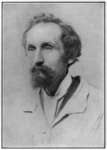Jonathan Scott Hartley
Jonathan Scott Hartley (September 23, 1845 – 1912), American sculptor, was born at Albany, New York.[1]
Jonathan Scott Hartley | |
|---|---|
 | |
| Born | September 12, 1845 |
| Died | 1912 |
| Nationality | American |
| Known for | Sculpture |
Biography
He was a pupil of Erastus Dow Palmer, New York, and of the schools of the Royal Academy, London; he later studied for a year in Berlin and for a year in Paris. His first important work (1882) was a statue of Miles Morgan, the Puritan, for Springfield, Massachusetts. Among his other works are the Daguerre Memorial in Washington; Thomas K. Beecher, Elmira, New York, and Alfred the Great, Appellate Division Courthouse of New York State. He devoted himself particularly to the making of portrait busts, in which he attained high rank. In 1881 he became a member of the National Academy of Design.[1]
He sculpted three of the nine busts around the front of the Thomas Jefferson Building of the Library of Congress in Washington, DC. His Nathaniel Hawthorne, often mistaken for Mark Twain, has pride of place in the ornate west front gallery of the original Library of Congress building, finished in 1897. He also sculpted the Washington Irving and the Ralph Waldo Emerson. The Emerson bust is an exact likeness, as Hartley, and especially his supervisor, Ainsworth Rand Spofford, knew how prominent Emerson's nose actually was.
Gallery
Further reading
- Durante, Dianne, Outdoor Monuments of Manhattan: A Historical Guide (New York University Press, 2007), Essay 2.
References

External links
| Wikimedia Commons has media related to Jonathan Scott Hartley. |
.jpg)
